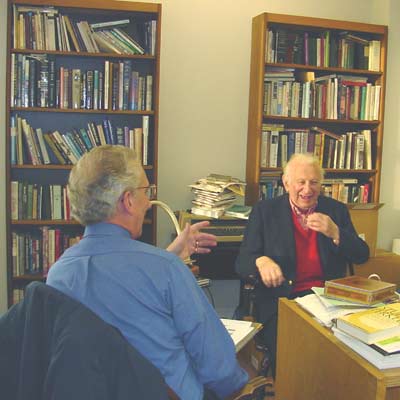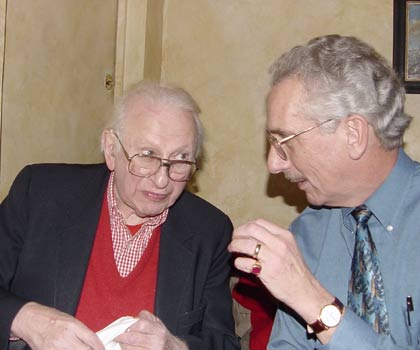|
 Several
weeks ago, I would have given my right arm to continue my interview over dinner
with Studs Terkel, the legendary writer of the 20th century.
Fortunately, he went willingly thus sparing the loss of twenty-five percent of
my appendages. When I contacted Studs, I requested a simple interview, but in
the back of my mind, I wanted to take him out for dinner and continue our talk
over a meal, followed by cigars and after-dinner drinks. I thought that the
discussion over a meal and then cigars would be more relaxing and free Studs to
be more conversant. Little did I know that all you need to do is to ask him a
question-and then sit back and listen to this storyteller recount his memories
of most of the past century. Studs interviewed and wrote about kings and
commoners-but mostly common people. Several
weeks ago, I would have given my right arm to continue my interview over dinner
with Studs Terkel, the legendary writer of the 20th century.
Fortunately, he went willingly thus sparing the loss of twenty-five percent of
my appendages. When I contacted Studs, I requested a simple interview, but in
the back of my mind, I wanted to take him out for dinner and continue our talk
over a meal, followed by cigars and after-dinner drinks. I thought that the
discussion over a meal and then cigars would be more relaxing and free Studs to
be more conversant. Little did I know that all you need to do is to ask him a
question-and then sit back and listen to this storyteller recount his memories
of most of the past century. Studs interviewed and wrote about kings and
commoners-but mostly common people.
When I broached the dinner invitation with Studs, he wanted my wife and I to be
his guests. I replied that he could choose the restaurant, but it would be my
honor to have him as our guest. We argued politely about who was going to pay
the bill, but after several exchanges, he abruptly withdrew from the battle like
the Taliban and came over to my side as if I were the Northern Alliance. So,
the Chicago's version of the Northern Alliance made up of Sharon, his assistant,
my wife, and I went off to the restaurant of his choice. Studs' sudden
surrender caught me off guard for I had already formed my next rebuttal to why
it should be my treat.
I learned two things from that little sparring with Studs and his unexpected
retreat. Ida, his wife who died two years ago, had told him for years that he
had to learn to be more gracious with people and accept their expressions of
appreciation. Throughout his life, Studs was always championing the causes of
the poor or the oppressed. Having made it his life to give, he found it
difficult to receive. Ida had called him on the carpet many times over this
character glitch that style was so much a part of his life.
In addition, I also discovered just how much influence his late wife had upon
him. He gave in to our offer as soon as he heard Ida's voice in his head
reminding him of her instruction to be more gracious. It was a tender moment
about which I hesitated to write, but it provides an insight into Studs'
tenderness and reverence for Ida.
When we arrived at a local Italian restaurant, it was around 5:30 and hardly any
other diners were around including a matre de. So, Studs leads us to a corner
table like a pied piper. He obviously was heading for his table. Suddenly,
from her inattentiveness, sprang a hostess who rushes up to our party with a
bizarre inquiry: "Do you have reservations?" Studs wasn't inclined to respond
to her request and continued to his table, but the restaurant was all but
empty. I managed to say to the officious hostess, "No, but we would like to sit
here in the corner." Didn't she know that this was for me the interview of a
lifetime? It is hard to find good help nowadays.
 The hostess was so put off by Studs seating us that she said like a kindergarten
teacher, "Well, you'll have to be finished by 7:30." Wow! She had set the
parameters for my interview. I had just doubled my interview time with
Studs-two hours at the Chicago Historical Society and now two additional hours
at the restaurant. I was hoping that Studs would be obedient and allow me to
use the hostess' allotted time.
The hostess was so put off by Studs seating us that she said like a kindergarten
teacher, "Well, you'll have to be finished by 7:30." Wow! She had set the
parameters for my interview. I had just doubled my interview time with
Studs-two hours at the Chicago Historical Society and now two additional hours
at the restaurant. I was hoping that Studs would be obedient and allow me to
use the hostess' allotted time.
As soon as we were settled, a server came up to the table to take our drink orders. He
was courteous. After two classes of wine, a martini, and a seven and seven were
ordered, we set out to look over the menu. Studs was the first to select his
meal-spaghetti with sausage. Putting his menu down, he turned to me ready for
my interrogation. I had planned to ask him some one-line impressions of people
in the news. Asking Studs for one-liners is the ultimate oxymoron. All of his
responses were longer than the 750-word articles that I write for my newspaper.
 After dinner, as the coffee was served,
I heard a young gal behind me say, "Mr. Terkel?" She wanted to get Studs'
autograph. He was caught a little off guard and asked the woman how she
recognized him? "Your voice," she replied. We all laughed at her honesty and
how true it was that Studs' voice is like none other. As Studs signed a piece a
paper for the admirer, I attempted to fill the silence with my question to the
autograph seeker, "Do you know who Al Campbell is?" She shook her head that she
didn't. You could see that she worried that she might not have known some
famous literary giant. I replied cryptically and somewhat under my breath,
"Well, you will-someday."
After dinner, as the coffee was served,
I heard a young gal behind me say, "Mr. Terkel?" She wanted to get Studs'
autograph. He was caught a little off guard and asked the woman how she
recognized him? "Your voice," she replied. We all laughed at her honesty and
how true it was that Studs' voice is like none other. As Studs signed a piece a
paper for the admirer, I attempted to fill the silence with my question to the
autograph seeker, "Do you know who Al Campbell is?" She shook her head that she
didn't. You could see that she worried that she might not have known some
famous literary giant. I replied cryptically and somewhat under my breath,
"Well, you will-someday."
We left the restaurant to continue the interview over after-dinner drinks and
cigars, but you will have to wait for that story as do I have to wait until some
literary admirer asks for my autograph.
|







 Several
weeks ago, I would have given my right arm to continue my interview over dinner
with Studs Terkel, the legendary writer of the 20th century.
Fortunately, he went willingly thus sparing the loss of twenty-five percent of
my appendages. When I contacted Studs, I requested a simple interview, but in
the back of my mind, I wanted to take him out for dinner and continue our talk
over a meal, followed by cigars and after-dinner drinks. I thought that the
discussion over a meal and then cigars would be more relaxing and free Studs to
be more conversant. Little did I know that all you need to do is to ask him a
question-and then sit back and listen to this storyteller recount his memories
of most of the past century. Studs interviewed and wrote about kings and
commoners-but mostly common people.
Several
weeks ago, I would have given my right arm to continue my interview over dinner
with Studs Terkel, the legendary writer of the 20th century.
Fortunately, he went willingly thus sparing the loss of twenty-five percent of
my appendages. When I contacted Studs, I requested a simple interview, but in
the back of my mind, I wanted to take him out for dinner and continue our talk
over a meal, followed by cigars and after-dinner drinks. I thought that the
discussion over a meal and then cigars would be more relaxing and free Studs to
be more conversant. Little did I know that all you need to do is to ask him a
question-and then sit back and listen to this storyteller recount his memories
of most of the past century. Studs interviewed and wrote about kings and
commoners-but mostly common people.  The hostess was so put off by Studs seating us that she said like a kindergarten
teacher, "Well, you'll have to be finished by 7:30." Wow! She had set the
parameters for my interview. I had just doubled my interview time with
Studs-two hours at the Chicago Historical Society and now two additional hours
at the restaurant. I was hoping that Studs would be obedient and allow me to
use the hostess' allotted time.
The hostess was so put off by Studs seating us that she said like a kindergarten
teacher, "Well, you'll have to be finished by 7:30." Wow! She had set the
parameters for my interview. I had just doubled my interview time with
Studs-two hours at the Chicago Historical Society and now two additional hours
at the restaurant. I was hoping that Studs would be obedient and allow me to
use the hostess' allotted time.  After dinner, as the coffee was served,
I heard a young gal behind me say, "Mr. Terkel?" She wanted to get Studs'
autograph. He was caught a little off guard and asked the woman how she
recognized him? "Your voice," she replied. We all laughed at her honesty and
how true it was that Studs' voice is like none other. As Studs signed a piece a
paper for the admirer, I attempted to fill the silence with my question to the
autograph seeker, "Do you know who Al Campbell is?" She shook her head that she
didn't. You could see that she worried that she might not have known some
famous literary giant. I replied cryptically and somewhat under my breath,
"Well, you will-someday."
After dinner, as the coffee was served,
I heard a young gal behind me say, "Mr. Terkel?" She wanted to get Studs'
autograph. He was caught a little off guard and asked the woman how she
recognized him? "Your voice," she replied. We all laughed at her honesty and
how true it was that Studs' voice is like none other. As Studs signed a piece a
paper for the admirer, I attempted to fill the silence with my question to the
autograph seeker, "Do you know who Al Campbell is?" She shook her head that she
didn't. You could see that she worried that she might not have known some
famous literary giant. I replied cryptically and somewhat under my breath,
"Well, you will-someday."